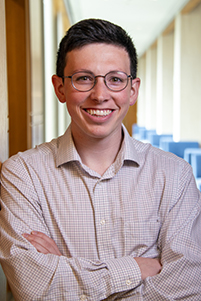
When it came time to choose a college, Tommy Dowd knew exactly where he would go. “I come from a UConn through-and-through family,” he explains. “One of my brothers went to UConn. My parents met at UConn. My aunt was the one who introduced them.”
What he was less certain about was his path after graduation.
The Wethersfield native, a double-major in political science and economics, considered law school until a chance encounter with a fellow student opened an unexpected door.
“I was studying for an exam in the library on a floor I’d never been to,” he explains. “This kid came up to me and said, ‘We’re in the same class.’ We studied together, and he told me about the 4+1 program.”
“As a sophomore I didn’t really know what I wanted to do with my life, but this seemed like a really good opportunity to explore interests I already had,” he says. “It’s a slightly heavier course load since you’re working on your master’s degree while still an undergrad, but instead of two additional years of study, you only add one. And in that final year, you complete an internship in your field that you’re getting paid for. You gain an advantage by having an advanced degree just one year out of college – it gives you so much flexibility.”
He applied and began UConn’s School of Public Policy’s 4+1 MPP Fast-Track program in his junior year. The additional coursework didn’t deter him despite his busy extracurricular schedule. As an undergrad, Tommy spent three years working at UConn’s Visitors Center, giving tours to prospective students. He was also a member of A Minor, one of UConn’s a cappella groups, and spent spring breaks with Honors Across State Borders, working with Habitat for Humanity chapters in other states to build affordable housing.
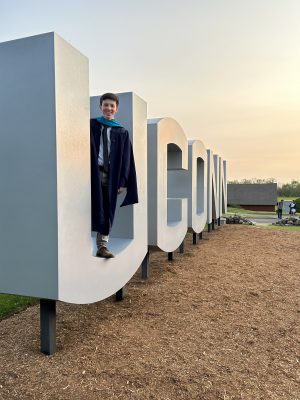 “You’re taking graduate-level classes in undergrad, so you get exposure to what a postgraduate course load is like,” he says. He also found his classmates more engaged in graduate-level classes.
“You’re taking graduate-level classes in undergrad, so you get exposure to what a postgraduate course load is like,” he says. He also found his classmates more engaged in graduate-level classes.
Another chance encounter in the spring of 2023, during his final semester of grad school, introduced Tommy to the Institute for Municipal and Regional Policy (IMRP) at the School of Public Policy.
“I needed to round out my schedule with an elective, so I decided to take Justice Reinvestment with Professor Bob Wilson. It sounded interesting to learn about real-world applications of public policy.”
Students were tasked with creating a history of two IMRP initiatives: the Connecticut Sentencing Commission (CTSC) and the Connecticut Racial Profiling Prohibition Project (CTRP3).
“I hadn’t previously heard of the IMRP,” he admits. “The Institute at the School focuses on evidence-based research and evaluation of state criminal justice policies. Andrew Clark, the director, and Ken Barone, the associate director, came to the class to explain the type of written history they were looking for.”
The course was transformative for Dowd, who has always been passionate about politics and civic engagement.
“This was one of my first experiences doing legislative research and seeing the evolution of a policy program – how you turn something from an idea into a law,” he explains. “These aren’t just words in a textbook; these are policies that impact peoples’ lives.”
To complete the work, Dowd and his classmates conducted interviews with stakeholders including members of the Sentencing Commission, legislative leaders like former Rep. Bill Dyson, and Connecticut police chiefs. The project wasn’t finished before the end of the semester and graduation, so Professor Wilson hired Tommy as a graduate assistant that summer to complete the project’s edits and revisions.
Through that experience, Tommy stayed in contact with Alex Tsarkov, then executive director of the Connecticut Sentencing Commission, who needed student workers for various research projects. Tommy began working part-time with Tsarkov, about 25-30 hours per week, until a full-time position opened in March 2024, once again placing himself in the right spot for the next step in his career.
“I didn’t sign up for the class thinking ‘This is what I’m going to do for my first job,’” he reflects. “You never know how these things will evolve, so always bring your best self to the table.”
I didn’t sign up for the class thinking ‘This is what I’m going to do for my first job. You never know how these things will evolve, so always bring your best self to the table.
Though initially interested in economic policy, his classroom experiences introduced him to criminal justice policy, which he finds more complex.
“It’s a very different way of thinking about public policy,” he says. “In economic policy, people will argue about details of tax rates or healthcare plans, but everyone basically shares the same goals. In criminal justice policy, you encounter deep, philosophical questions: What is justice? How do we balance public safety with giving people who have committed offenses a chance to turn their lives around? We aim for evidence-based, cost-effective decision-making, yet many of those choices are shaped by normative, moral-based questions that center on how we treat people as a society.”
What is justice? How do we balance public safety with giving people who have committed offenses a chance to turn their lives around? We aim for evidence-based, cost-effective decision-making, yet many of those choices are shaped by normative, moral-based questions that center on how we treat people as a society.
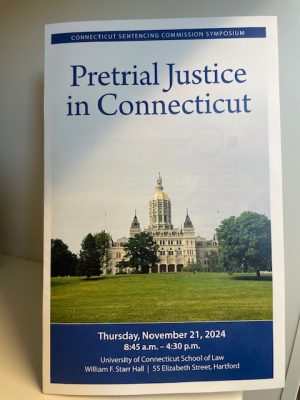 In his role as program assistant, he handles all administrative functions for the CTSC including scheduling meetings, recording minutes, updating the website, and responding to inquiries. Dowd also contributes to legislative research, drafting sections of reports or editing sections of reports received from external partners.
In his role as program assistant, he handles all administrative functions for the CTSC including scheduling meetings, recording minutes, updating the website, and responding to inquiries. Dowd also contributes to legislative research, drafting sections of reports or editing sections of reports received from external partners.
Last fall, he assisted Tsarkov with the Commission’s sixth symposium: Pretrial Justice in Connecticut, a full-day event at the UConn School of Law with more than 150 attendees. Dowd helped manage all aspects of planning including venue coordination, arranging presenters and panelists, compiling the program, and overseeing stakeholder communication.
He now works with Rich Sparaco, recently appointed interim executive director of the Sentencing Commission following Tsarkov’s departure for Connecticut’s Board of Pardons and Paroles. Along with other IMRP staff and CTSC members, he attended the National Association of Sentencing Commissions annual conference in Madison, Wisconsin in August.
“There’s a niche community around the country of people who do the same job I do. It was great to meet them, hear how their commissions function, and bring back ideas about processes that can make a greater impact in our justice system.”
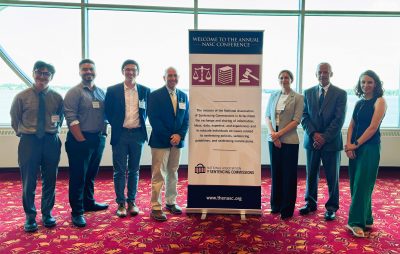
“I’m very thankful,” he says of his transition to a full-time role as a program assistant for the Connecticut Sentencing Commission and staff member of the IMRP. “I came into SPP not knowing much about what an MPP was or what it can do for me, and here I am five years later in an established field. It really has taken me on a journey, giving me the skills, experiences, and connections to turn my broad interests into a career path.”
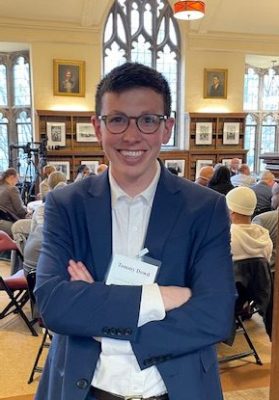
To current students, he offers advice:
“Be willing to always put your best foot forward, work hard, make connections with classmates and professors, and be a good team player. You never know when that door is going to open for you.”
In his own words: Click to Watch: From Classroom to Commission.
Learn more about the School of Public Policy’s 4+1 Fast-Track program.
Learn more about the Institute for Municipal and Regional Policy
Learn more about the Connecticut Sentencing Commission.